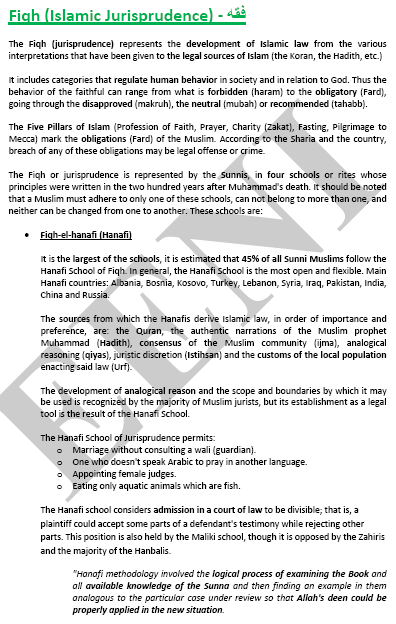Fiqh - Islamic Jurisprudence. Hanbali School

Development of the Islamic Law (Fiqh) legal sources of Islam (Koran, Hadith)
- Introduction to the Islamic Jurisprudence (Fiqh)
- Islamic Law Development based on the Koran and Hadiths
- Sunni schools of Islamic Jurisprudence:
- Fiqh-al-Hanafi
- Fiqh-al-Maliki
- Fiqh-al-Shafi
- Fiqh-al-Hambali

The Subject “Fiqh (Islamic Jurisprudence)” belongs to the following Online Programs taught by EENI Global Business School:

Masters: International Business, Foreign Trade, Religions & Business.
Doctorate: Ethics, Religion & Business, Islamic Business.
Languages:  or
or  Fiqh
Fiqh  Fiqh (Jurisprudence islamique)
Fiqh (Jurisprudence islamique)  Islão.
Islão.
Islamic Jurisprudence (Fiqh).
Fiqh (jurisprudence) represents the Islamic Law development from the various interpretations that have been given to the legal sources of Islam (Koran, Hadith).
Fiqh includes categories that regulate the human behavior in the society and relation to God. Thus, the behavior of the faithful can range from what is forbidden (haram) to obligatory (Fard), going through the disapproved (makruh), neutral (mubah) or recommended (tahabb).
The Five Pillars of Islam (Profession of Faith, Prayer, Charity (Zakat), Fasting, Pilgrimage to Mecca) mark the obligations (Fard) of a Muslim.
According to the Sharia (and country), flout of any of these obligations may be a legal offence or crime.
Fiqh, or jurisprudence, is represented by the Sunnis, in four schools:
1) Fiqh-al-Hanafi (Hanafi)
- It is the largest school, approximately 45% of all Sunni Muslims follow the Hanafi School of Fiqh
- In general, the Hanafi School is the most open and flexible. The main Hanafi countries are Albania, Bosnia and Herzegovina, Kosovo, Turkey, Lebanon, Syria, Iraq, Pakistan, India, China, and Russia
2) Fiqh-al-Maliki (Maliki)
- The Maliki School of Jurisprudence is part of the official legal codes of the State of Kuwait, Bahrain, and the Emirates
- Main Maliki countries are Morocco, Algeria, Tunisia, Mauritania, Kuwait, Oman, Libya, Sudan, and Egypt
3) Fiqh-al-Chafiy (Shafi)
- The School Fiqh-al-Shafi is recognized as the official school of the governments of Brunei and Malaysia
- The Indonesian Government used this law school for Sharia development
- Main countries are Egypt, South of the Arabian Peninsula, Tanzania, Kenya, Djibouti, Somalia, Sri Lanka, Indonesia, and the Philippines
4) Fiqh-al-Hamball (Hambali)
- The Hambali School is considered as the most puritanical and strict of Islam, the interpretation of the Koran and tradition must always be literal, not having a margin for the interpretation
- The Hambali School has expanded from the Arabian Peninsula
- Main Hambali countries: Saudi Arabia, Qatar, and Yemen
It should be noted that a Muslim must adhere to only one of these schools, cannot belong to more than one, and neither can be changed from one to another.
Sample - Fiqh (Islamic Jurisprudence) - Islamic Civilization

(c) EENI Global Business School (1995-2024)
We do not use cookies
Top of this page



